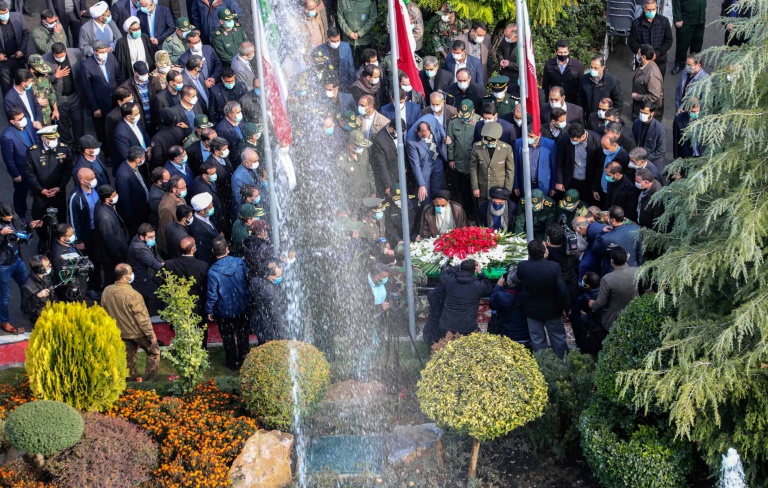
TEHRAN: Iran laid to rest a nuclear scientist in a funeral befitting a top "martyr" Monday, vowing to redouble his work after an assassination pinned on arch-foe Israel.
Mohsen Fakhrizadeh died on Friday from his wounds after assailants targeted his car and engaged in a gunfight with his bodyguards outside the capital, according to the defence ministry, heightening tensions once more between Tehran and its foes.
State television showed several high-ranking Iranian officials mourning the nuclear scientist's death at the ceremony, including defence minister Amir Hatami and the head of the Revolutionary Guards Hossein Salami.
The funeral, held at the ministry, got underway with a religious singer praising Fakhrizadeh and alluding to the martyrdom of Imam Hossein, the revered 7th century holy figure from whom Shiite Muslims draw inspiration.
"If our enemies had not committed this heinous crime and spilled our dear martyr's blood, he might have remained unknown," Hatami said in a speech.
"But today, he who was only an idol for [...] his students and colleagues, is introduced to the whole world," he added, saying he will be an inspiration for "all who embark on the path to fight."
"The enemies should know, that this is their first defeat."
Hatami had said after the scientist's death that Fakhrizadeh was one of his deputies and headed the ministry's Defence Research and Innovation Organization, focusing on the field of "nuclear defence."
In his speech, he said the government has decided to double the organisation's budget to continue Fakhrizadeh's path "vigorously."
A large display showed a picture of Fakhrizadeh next to Iran's supreme leader Ayatollah Ali Khamenei, as well as former top general Qasem Soleimani, who was killed in a January air strike by the US in Baghdad.
At around 11:30 am (approximately 0800 GMT) the scientist's coffin was being buried at Imamzadeh Saleh, an important Shiite shrine in northern Tehran where two other slain nuclear scientists were buried in 2010 and 2011.
- Iran weighs retaliation -
Iran's President Hassan Rouhani has accused arch-foe Israel of acting as a US "mercenary", blaming it for the killing of Fakhrizadeh, and supreme leader Khamenei has called for the perpetrators to be punished.
The assassination has led to demands for a strong response from the Iranian leadership and calls by some to avoid entering potential negotiations with the United States, even as the hawkish presidency of Donald Trump draws to a close.
Iran's parliament on Sunday demanded a halt to international inspections of nuclear sites in the country, a step that could prove a fatal blow to the nuclear deal the Islamic Republic agreed with world powers in 2015.
The head of the expediency council Mohsen Razai hinted Iran should leave the global non-proliferation treaty.
Trump withdrew from the Iran nuclear deal in 2018 and began reimposing and reinforcing crippling sanctions, but US President-elect Joe Biden has promised a return to diplomacy.
Rouhani has emphasised that the country will seek its revenge for the assassination in "due time" and not be rushed into a "trap."
The United States slapped sanctions on Fakhrizadeh in 2008 for "activities and transactions that contributed to the development of Iran's nuclear programme".
The funeral was not open to the public in order to maintain health protocols over the novel coronavirus pandemic, the defence ministry said.
As part of the procession before the funeral, Fakhrizadeh's remains were taken on Saturday and Sunday to holy Shiite shrines in the northeastern city of Mashhad and Qom in central Iran, as well as the shrine of the founder of the Islamic republic, Ruhollah Khomeini in Tehran.
Iran has responded to the US withdrawal from the 2015 deal by gradually abandoning most of its key nuclear commitments under the agreement.
Some "say we can make the enemy not have enmity (towards us) through taking. That is not possible," said the supreme leader's representative at the defence ministry, Ziaodin Aghajanpour, standing next to Fakhrizadeh's coffin.
"Why? Because the enemies are against the basis of the Islamic republic system," he added, emphasising that Iran's foes "will never cease their enmity."